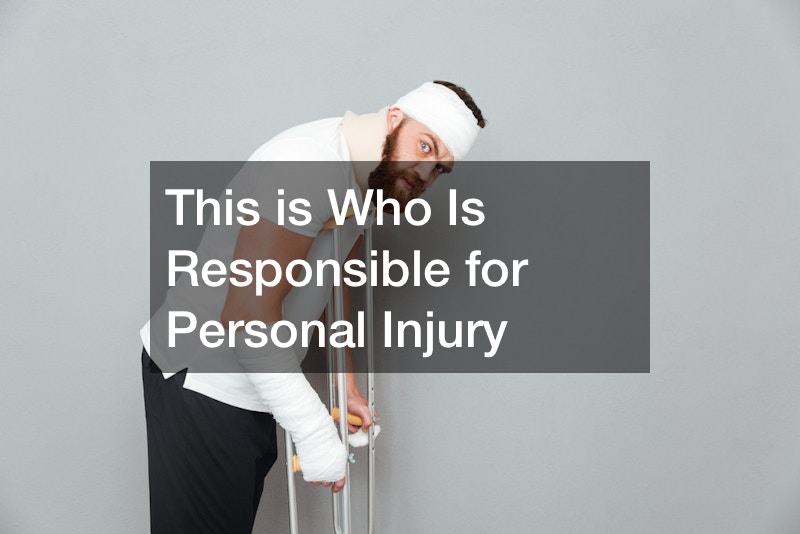This is Who Is Responsible for Personal Injury

When you’ve been injured due to someone else’s actions, you may want compensation for their actions. If you’re seeking a lawyer, you’ll need one handling personal injury claims. These lawyers are experienced in personal injury claims, and can support you throughout your case.
Attorneys Can Explain Laws
When you contact an attorney, they’ll provide a “personal injury law 101” about your case. They’ll review the steps you’ll take. Your lawyer will guide you through paperwork.
Without an experienced attorney, litigation process personal injury claims may seem overwhelming. However, the legal strategizing will be done by the attorneys. All you need do is tell the truth and follow your doctor’s directions.
Lawyers Ask Questions
Relevant personal injury topics include a police report. The lawyer will need a copy of it. The law team will also ask your doctor about the extent of limitations from your injury. They’ll also want to know when you will recover, and return to work.
An injury causes loss of mobility. It can also keep you unable to work. While it may seem difficult to divert your focus from your injury, enlisting the help of a personal accident lawyer is an important step.

The possibilities for personal injury cases seem to abound. Between car accident cases, medical malpractice, slip and fall injuries, or defective products, it seems that almost everyone is at risk for personal injury. However, the question remains: who is responsible for personal injury? This can get fuzzy, depending on the situation, and in most cases, if you’re a victim of personal injury, it’s wise to have a personal injury attorney going to bat for you. Their legal advice and guidance when it comes to filing paperwork and negotiating settlements is invaluable. It’s also good to know when you need an attorney — and when you might not. So let’s talk about personal injury cases, when it’s time to get an attorney on your team, and exactly who is responsible for personal injury.
What are the Most Common Types of Personal Injury Cases?
The United States Department of Justice reports that the most common types of personal injury cases are motor vehicle accidents (which account for over half), medical malpractice cases (which are around 15%), and product liability, which accounts for about 5%.
Every year, around three million people get hurt in car accidents in the United States and around 20,000 medical malpractice claims get filed annually. Chillingly, wrong site surgeries happen around 40 times a week and the Journal of the American medical Association says that over 200,000 people die annually from medical malpractice.
Another type of personal injury case are slip/fall accidents. The Centers for Disease Control and Prevention state that there are around 17,000 of these accidents happen on an annual basis. Almost a quarter of these accidents meant employees had to stay away from work for over 31 days and were responsible for a quarter of all reported injury claims each fiscal year, costing employers money.
Who Is Responsible for Personal Injury?
To make a personal injury case, you must determine that someone (whether that’s an individual, corporation, or other entity) was negligent or simply careless, putting you at risk. However, there are some loopholes within that. For example, if you were trespassing and got hurt on someone’s property because of their negligence, they may still not be at fault, because you shouldn’t have been on their property to begin with.
If there are two parties at fault — say, for example, you were injured while using a defective product and the manufacturer and seller are both involved in the case — at least one of them has to make reparations. The manufacturer and seller will have to decide who compensates and what reimbursement should look like between them.
In the case that you were careless, along with the other party, you may still be eligible to get some compensation, but it’s a little trickier. This is covered under comparative negligence and each state approaches it in a different way. In some cases, you may not be eligible for any compensation, especially if your carelessness contributed to the accident.
When Should I Look Into a Personal Injury Attorney?
You should definitely look into hiring a personal injury attorney if the accident was severe and you’re suffering from long term or permanent disabilities or injuries as a result. Any medical malpractice case is also a good reason to get an attorney. You should also hire a personal injury attorney if the insurance company is putting up a fight in regards to paying or the party at fault is refusing to acknowledge responsibility.
Sometimes all it takes is the presence of an attorney, which threatens legal action, for an individual or company to back down and do the right thing. In other cases, their legal expertise and skills will prove invaluable in terms of filing the appropriate paperwork, negotiating on your behalf, and making sure all your bases are covered.
Now that you have a better idea of who is responsible for personal injury and what sorts of things are covered under the term “personal injury,” if you find yourself embroiled in such a case, be smart! Don’t waste any time in hiring a personal injury attorney.
